
You might be wondering:
“Why am I not ranking first in Google for [INSERT KEYWORD]?”
It’s not a bad question—it shows you value your business’ position in search engine results pages (SERPs) and understand that organic—or unpaid—search traffic can give you a continual stream of targeted traffic, qualified leads and, eventually, paying clients.
But if you, too, are asking this question, you’re focusing on the wrong measure of SEO success.
Don’t worry. I’m not avoiding your question—I’ll answer it in this post.
But before I do, allow me to reframe your problem with another question:
“What is the real goal of your SEO efforts: increasing your Google ranking, or creating a continual stream of qualified leads?”
Here’s the thing: your keyword rankings for a variety of terms should increase with any comprehensive SEO strategy.
But that’s not the goal. And it shouldn’t be your focus.
While we are monitoring how you are ranking across of hundreds—even thousands—of keywords, we don’t measure the success of your campaign by SERP rankings.
And why would we? You want to attract qualified leads, not win a blue ribbon for ranking first for a specific keyword. It’s the trend of rankings across industry-related keywords that will drive business, not ranking for any one keyword.
Here’s how we measure success:
- An increase in tracked engagements (calls and form submissions directed from your site)
- Number of qualified leads month by month (those who’re a good fit for your business, and interested in your product or service)
- The overall trend in rankings for various keyword themes—groups of keywords surrounding your business’ key service areas, products or markets
“But wait—I thought SEO was all about keyword rankings”
Okay sure, increased rankings in Google are correlated to an increase in targeted traffic and qualified leads—that’s the very idea that search engine optimization is built upon.
But SEO is not about winning a specific keyword. See, 3.5 billion Google searches are made. Every. Single Day.
And about 16 to 20 percent of those searches have never been made before. Especially as searchers become more comfortable asking Google complex questions, optimizing for specific keywords isn’t enough.
The best way to rank for these new, never-been-searched-before keywords is to have a strategy focused on building helpful content surrounding all facets of your business, and optimizing for every possible question a potential client might have from awareness to conversion.
By creating shareable content and increasing the number of sites linking to you, you will increase your Domain Authority and, eventually, increase your SERP rankings for industry-relevant searches—even searches that have never been asked before.
Yes, you still need to have a robust keyword-targeted SEO strategy. But now more than ever, you need to be more focused on addressing questions, improving user experience and creating a robust collection of web pages, blogs and backlinks in order to compete for the ongoing stream of new, long-tail search queries.
That’s why we—though we thoroughly monitor your SERP rankings over time for hundreds of keywords—focus most of our time on “keyword themes” rather than individual keywords.
Back to your question: “How do I rank first in Google for [INSERT KEYWORD]”?
I know what you’re thinking:
“This is great and all, but I still need to rank #1 for [INSERT KEYWORD]! How do I do that?!??”
Okay, let me actually answer your original question. One caveat before we begin: the answer is not simple.
Let’s say you desperately want to know how to rank #1 in Google for the keyword “locksmith STL.”
There are at least five other variations of that same keyword. Locksmith St. Louis. St. Louis locksmith. Locksmith in St. Louis. Even locksmiths STL.

Though these keywords all seem the same, you will get a slightly different SERP for each one. You might appear for “St. Louis locksmith” but not “Locksmith STL.”
To drive this point home, let’s compare the SERPs for two Google searches: “locksmith STL” and “locksmiths STL.”
The ads are different. The local pack is different. And the organic results are different. 

You might be ranking for every single variant of “St. Louis + Locksmith” except “locksmith STL.”
See, if you focus only on one keyword, you’re missing the big picture.
And this example only shows generic location-based searches.
What about when someone searches, “How to get broken key out of ignition”? Or when they search “How to fix a door lock that is jammed?” Or when they just want to know the “cost of rekeying a lock”?
You could lose your mind trying to optimize for every single variant of every single keyword. Even for the best SEO companies, optimizing for every possible search query is impossible.
Remember: Nearly 630 million Google searches are made every single day that have never been searched before.
Shift your focus from specific keywords to “keyword themes”
At Digital Strike, we do tons of keyword research for each of our clients.
We’ll create a detailed spreadsheet of every possible keyword phrase someone might use when talking about your products or services, from the awareness phase (when someone is looking for a solution to a problem), all the way to down to the purchasing decision or conversion.
In any given SEO campaign, we are optimizing for hundreds of keywords for every market you serve, service you provide or product you sell.
Usually, each of these keywords can be distilled down to several “themes,” or broad areas of focus that we’re optimizing for.
Let’s tie the locksmith example back in:
You provide both residential and commercial locksmith services. The end goal of your SEO campaign is to leverage targeted search traffic, turning searchers into paying customers.
Once we understand your business and know your goals, we’ll do some keyword research.
We might find there are three main “keyword themes” surrounding the keywords in your business: residential, commercial and emergency services.
There are a variety of keywords that fall under these keyword themes:
- RESIDENTIAL
Example keywords: residential locksmith, front door lock replacement, how to rekey a deadbolt, door lock repair service - COMMERCIAL
Example keywords: commercial locksmith, electric strike installation, filing cabinet key replacement, digital safe lock change out - EMERGENCY
Example keywords: emergency locksmith, how to get a broken key out of ignition, locked out of house, commercial lockout
Of course, there are dozens of other keywords we could list under each theme. But essentially, these themes describe facets—service areas, products, or markets—of your business you’d like to grow.
We’ll develop a long-term content and link building strategy that encompasses many different ways to search about each theme. In the end, this will help increase your SERP rankings and, in the end, drive business for each of your service areas.
Bottom line is this:
Ranking for one keyword won’t drive results. Building a robust collection of web pages, blogs and backlinks surrounding the various services you provide and markets you serve will.
The success of your SEO campaign is measured by bottom line results, not keyword-by-keyword rankings.






